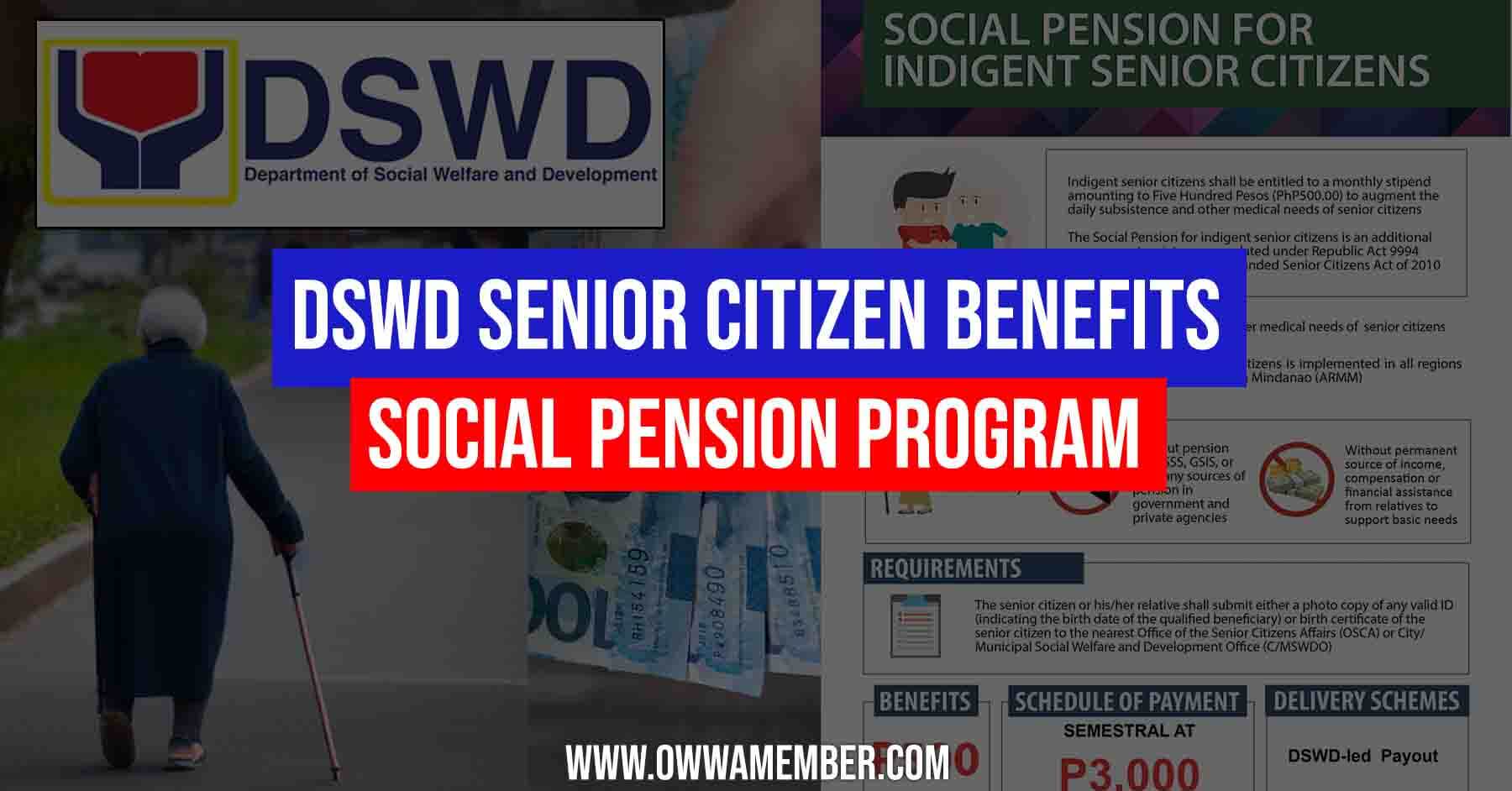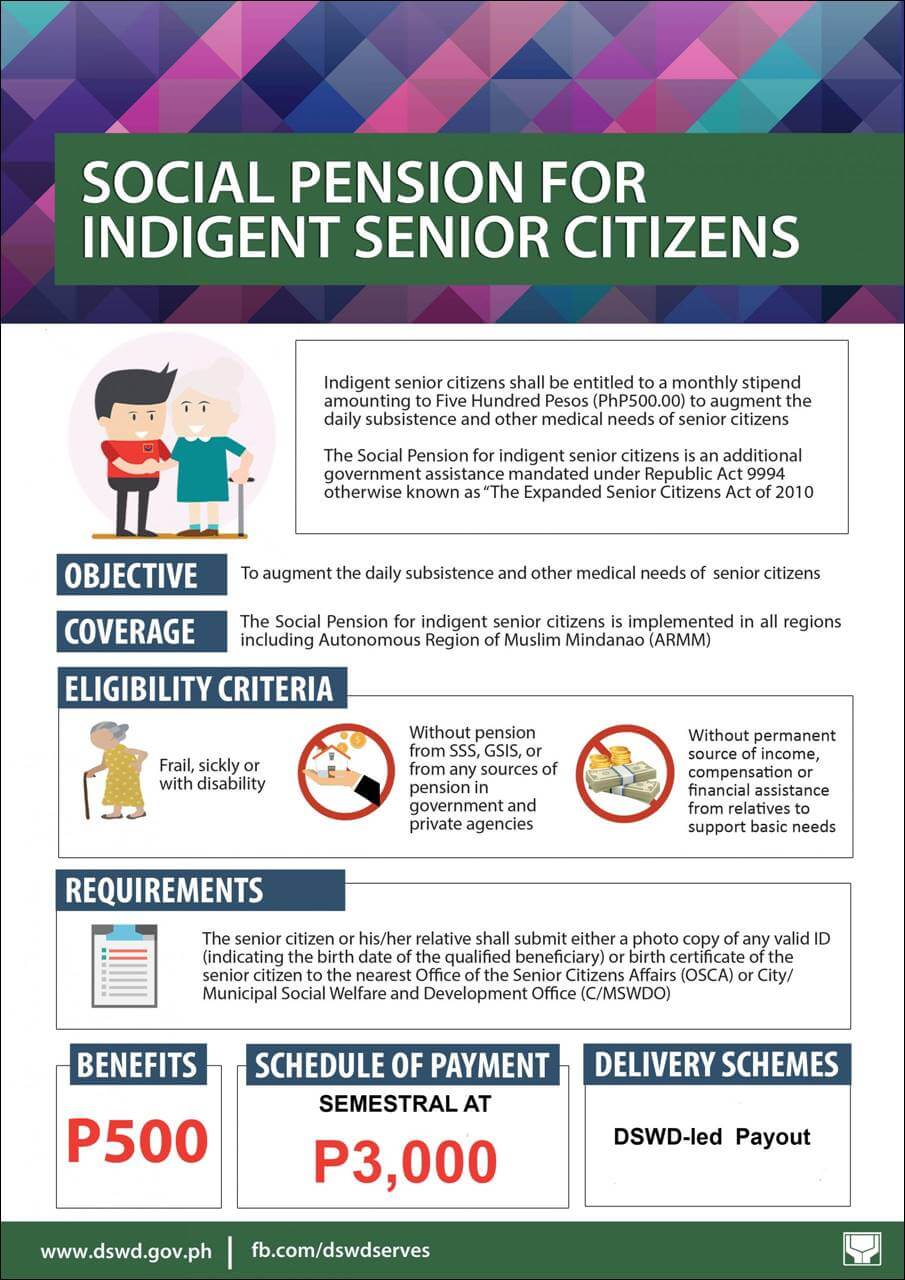Great news! The DSWD Social Pension Program is now available to senior citizens. The DSWD social pension is a monthly allowance for qualified indigent Filipinos aged 60 years and above. This benefit is intended to provide financial assistance for their basic needs such as food, shelter, clothing, and medicine.
Senior citizens who qualify for the program will receive a monthly pension of Php 500. This amount serves as financial assistance to qualified senior citizens who are considered indigent and have no other means of income.
Also Read: How to Avail DSWD Sustainable Livelihood Program
The DSWD social pension program aims to provide a stable source of income for qualified senior citizens and, thus, alleviate their state of poverty. Find out more about the DSWD social pension program below.
Contents
- What is DSWD Senior Citizen / Social Pension?
- Benefits
- What are the Legal Bases for this Program?
- Who are the Target Beneficiaries?
- DSWD Social Pension Eligibility Criteria
- What are the Requirements for the DSWD Social Pension Program?
- How to Process DSWD Senior Citizen / Social Pension
- PDF File for Implementing the Social Pension Benefits for Senior Citizens
- Video: Social pensions of poor senior citizens will be 1,000 a month | SONA
- Frequently Asked Questions
- Summary

What is DSWD Senior Citizen / Social Pension?
In 2010, the government enacted RA 9994 to provide additional financial assistance to senior citizens. This program aims to improve the living conditions of these individuals by providing them with a Social Pension. It also aims to reduce the incidence of hunger and provide them with medical and subsistence needs.
The program provides for the payment of a monthly stipend of Php 500 to senior citizens based on their eligibility criteria. Currently, indigent senior citizens receive Php 3,000 every six months. These individuals will be able to use the funds for their daily needs. The grant of the social pension is subject to review by Congress within two (2) years following the program’s implementation.
Benefits
- Available to all registered senior citizens in the community
- Php 500 monthly pension is released every six (6) months, amounting to Php 3,000 per payout – this amount aims to augment the daily subsistence and other medical needs of senior citizens.
- Implemented nationwide and prioritizes indigent community members.
- Application can be submitted to the City Social Welfare and Development Office (CSWDO) or at the
Office of the Senior Citizens Affairs (OSCA). - Protect indigent senior citizens from neglect, abuse, or deprivation; and
- Reduce the incidence of hunger among indigent senior citizens
What are the Legal Bases for this Program?
The DSWD is mandated to protect indigent senior citizens from neglect, abuse or deprivation. The law provides that the DSWD shall implement a nationwide program for the protection of indigent senior citizens from neglect, abuse or deprivation. The law also provides that the DSWD shall provide social services to senior citizens through its field offices. Here are some of the laws that govern the program enacted by the agency:
Section 11, article XIII, 1987 Philippine Constitution
“The State shall adopt an integrated and comprehensive approach to health development which shall endeavour to make essential goods, health and other social services available to all people at affordable cost. There shall be priority for the needs of the underprivileged, sick, elderly, disabled, women and children. The State shall endeavour to provide free medical care to paupers“.
Section 4, Article XV, 1987 Philippine Constitution
“The family has the duty to care for its elderly members but the State may also do so through just programs of social security”.
Section 1, Article 20, Rule V, Implementing Rules and Regulations of Republic Act 9994
Pursuant to the eligibility criteria as may be determined by the DSWD, indigent senior citizens shall be entitled to a monthly stipend amounting to Five Hundred Pesos (Php500.00) to augment the daily subsistence and other medical needs of senior citizens. The grant of social pension shall be subject to a review every two (2) years by Congress, in consultation with the DSWD within three (3) months after convening the Congress.
Philippine Plan of Action for Senior Citizens 2012-2016
Promotion of active ageing through social protection and support for the rights and welfare of senior citizens and their empowerment
Memorandum Circular No. 04, series of 2019 “Omnibus Guidelines in the Implementation of the Social Pension for Indigent Senior Citizens”
This provides a unified direction to DSWD FOs in partnership with the Local Government Units (LGUs) to ensure effective and efficient implementation of the program.
Who are the Target Beneficiaries?
In 2011, the program only covered those over 77 years old. In 2015, the age requirement was expanded to include people who are 65 years old and above. In 2016, the program will cover those who are 60 years old and above.
Those who are not included in the master list of Social Pension Program beneficiaries should contact the DSWD or the OSCA for assessment.
DSWD Social Pension Eligibility Criteria
Sixty (60) years old and above senior citizens who are:
- Frail, sickly or with a disability;
- No pension from the Government and Private Institutions;
- No permanent source of income; and
- No regular support from family or relatives for his/her basic needs.
Note: Not all senior citizens are qualified for the DSWD’s Social Pension Program. The program is only available to senior citizens who meet the eligibility criteria and are considered “poor or indigent” by the DSWD, as these groups require the most assistance. The DSWD Social Pension Program is also open to senior citizens who are unable to work due to old age or disability and those who have no regular source of income but need financial assistance.
What are the Requirements for the DSWD Social Pension Program?
In case the stipend will be claimed by an authorized representative, he/she shall present the following:
- Accomplished Certification and Authorization
- Photocopy of OSCA ID of the Beneficiary
- Photocopy of ID of the Claimant
- Certificate of Existence
For Deceased beneficiaries the claimant shall present the following:
- Original or Certified True Copy of Death Certificate
- Accomplished Warranty and Release from Liability
- Photocopy of OSCA ID of the Beneficiary
- Photocopy of ID of the Claimant
Note: If the beneficiary passes away on any day during the semester, he or she will still receive the full stipend, to be given to an authorized representative.
How to Process DSWD Senior Citizen / Social Pension
Please check the following steps below for the procedure to avail the cash assistance for senior citizens:
Step 1: To inquire about this program, senior citizens can visit the nearest City/Municipal Social Welfare Office (C/MSWDO and Office of the Senior Citizens Affairs (OSCA)) and DSWD Field Offices. These two agencies are respectively responsible for providing social welfare services to the residents of their local municipalities.
Step 2: Once assessed, the senior citizen applicant/ authorized representative will be notified regarding the status of their application for inclusion in the city’s master list of indigent senior citizens.
Step 3: Once the pension is processed, eligible members will be notified as to when and where the cash assistance payout will take place. The pensioner or their authorized representative must provide valid identification documents to claim the payout.
PDF File for Implementing the Social Pension Benefits for Senior Citizens
Here’s a PDF Copy of the Omnibus Guidelines In The Implementation Of The Social Pension For Indigent Senior Citizens – https://www.dswd.gov.ph/issuances/MCs/MC_2019-004.pdf
These guidelines have been issued to ensure the implementation of the Social Pension for Indigent Senior Citizens Act.

Video: Social pensions of poor senior citizens will be 1,000 a month | SONA
Few years back, lawmakers lobbied for the increase of the social pension to be 1,500 a month which the government had then vetoed. The approved increase in social pension from 500 to 1,000 pesos per month, still, is a welcome and much-needed development.
https://youtu.be/40qS-H0TYU8
However, the increase falls short of what many expected. The House of Representatives approved a resolution to increase the monthly pension from 500 to 1,000 pesos. Since these are indigent members of society, they are not expected to earn more than this amount.
However, many still have to support their families and send their children to school. Thus, the government must also assist in other forms, such as education grants and scholarships.
Frequently Asked Questions
You may check out the following FAQs about the DSWD social pension for indigent senior citizens:
1. What is the Social Pension?
The monthly Social Pension is a program that provides a cash payment of P500 to help alleviate the financial burden of senior citizens. It is implemented by the Department of Social Welfare and Development (DSWD).
2. What are the requirements for a senior citizen?
Sixty (60) years old and above senior citizens who are: 1 Frail, sickly or with disability; 2 No pension from the Government and Private Institutions; 3 No permanent source of income; and 4 No regular support from family or relatives for his/her basic needs.
3. Who informs the city of the pay out?
The DSWD Field Office will coordinate with the local government’s social welfare and development department to set the pay-out schedule.
4. Can a beneficiary receive a stipend if he dies?
If the beneficiary passes away on any day during the semester, he or she will still receive the full amount of the semester’s stipend.
The DSWD stated that only the “poorest of the poor” or indigent senior citizens are entitled to receive the social pension under the Republic Act of 2010.
6. How is economic status determined?
The economic status of a community is determined by the various social welfare and development offices that carry out the social pension program within its municipal or city halls.
7. Do LGUs maintain a senior citizen database?
The local government units (LGUs) are required to maintain a database of all senior citizen residents in their respective areas. They are also expected to coordinate with residential care facilities to update the database.
Summary
Senior citizens are one of the most marginalized groups in society, which is why they need special attention and care. They are often forgotten by their families and left behind to fend for themselves. The government, through the DSWD, has created a special program that caters to their needs.
The government also provides them with financial assistance, which they can use to support themselves and their families. By ensuring that senior citizens receive the proper care and attention, we can ensure that they will remain healthy and productive through their twilight years. This will also ensure they can continue contributing to society and the economy.
We hope you’ve gained some insight into how the government helps senior citizens. If you’re interested in learning more about the DSWD’s program, please visit their website.
DISCLAIMER: This post is only for educational and informational purposes. Should you have any questions, please contact your local DSWD office.